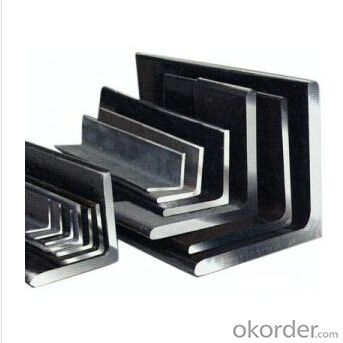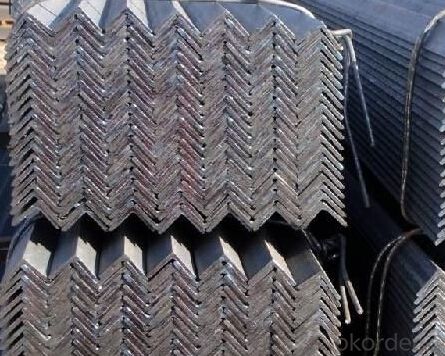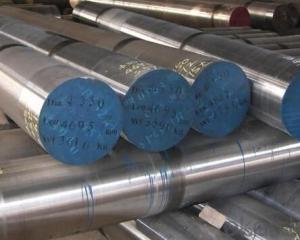High Quality Stainless Alloy Bearing Steel
- Loading Port:
- China Main Port
- Payment Terms:
- TT or LC
- Min Order Qty:
- -
- Supply Capability:
- -
OKorder Service Pledge
OKorder Financial Service
You Might Also Like
Product Description:
OKorder is offering High Quality Stainless Alloy Bearing Steel at great prices with worldwide shipping. Our supplier is a world-class manufacturer of steel, with our products utilized the world over. OKorder annually supplies products to European, North American and Asian markets. We provide quotations within 24 hours of receiving an inquiry and guarantee competitive prices.
Product Applications:
High Quality Stainless Alloy Bearing Steel are ideal for structural applications and are widely used in the construction of buildings and bridges, and the manufacturing, petrochemical, and transportation industries.
Product Advantages:
OKorder's High Quality Stainless Alloy Bearing Steel are durable, strong, and resist corrosion.
Main Product Features:
· Premium quality
· Prompt delivery & seaworthy packing (30 days after receiving deposit)
· Corrosion resistance
· Can be recycled and reused
· Mill test certification
· Professional Service
· Competitive pricing
Specifications of High Quality Stainless Alloy Bearing Steel
1. Grade: AISI 52100, ASTM E52100, DIN 1.3505,JIS SUJ2, GCr15
100Cr6 | 52100 | SUJ2 | GCr15 |
100CrMo7 | 100CrMo7 | SUJ5 | GCr18Mo |
20CrMo4 | 4118H | SCM418 | G20CrMo |
20NICrMo2 | 8520H | SNCM220 | G20CrNiMo |
- | - | 440C | 9Cr18 |
X108CrMo17 | S44004 | 440C | 9Cr18Mo |
2. Specification: Diameter: 5.5~350mm Length: 2000-6000mm or as required
3. Steel Grade: Bearing Steel
4. Certification: ISO9001-2000; CE, UL
5. Inspection: 100% Ultrasonic according to the test standards: SEP1921-84, GR.3 CLASS C/C
6. Packing situation: standard seaworthy packing or as customer required
7. Heat treatment:
Soft annealing: heat to 680-720°C, cool slowly.
Hardness after annealing: Max. 241 HB
Hardening: 820 - 850 °C
Normalizing temperature: 840-880°C
Tempering: 540-680°
Usage and Applications of Alloy Steel For Bearing
Alloy steel is used in making all kinds of bearing ring and rolling elements, like combustion engine, machine tool, and bearings for melting machine; also used for making tools and measuring tools.
Bearing steels are used for ball and roller bearing applications and are comprised of low carbon steels and high carbon through harden able steel.
Alloy Steel can be used in machine parts and engineering components.
Applications range: Chemical fertilizer pipe, building, machinery, textile industry, etc
Packaging & Delivery of Alloy Steel For Bearing
Packaging Detail: Standard seaworthy packing or as customer required; Packed in bundles with standard export sea-worthy package or as customer require
Delivery Detail: 45 days after order confirmed
Delivery condition: Black, peeled, machined
Trade terms: FOB, CFR, CIF
MOQ: 25 tons or at customer's demands
Production Flow of Alloy Steel For Bearing
Process: EAF+LF+VD+ Hot Rolled(Forged)+ Heat Treatment (Annealed, A Normalized, Q+T)
The processing is hot rolled (strictly control sulphur, phosphorus and non-metallic inclusions content and distribution).
FAQ:
Q1: Why buy Materials & Equipment from OKorder.com?
A1: All products offered byOKorder.com are carefully selected from China's most reliable manufacturing enterprises. Through its ISO certifications, OKorder.com adheres to the highest standards and a commitment to supply chain safety and customer satisfaction.
Q2: How do we guarantee the quality of our products?
A2: We have established an advanced quality management system which conducts strict quality tests at every step, from raw materials to the final product. At the same time, we provide extensive follow-up service assurances as required.
Q3: How soon can we receive the product after purchase?
A3: Within three days of placing an order, we will begin production. The specific shipping date is dependent upon international and government factors, but is typically 7 to 10 workdays.


- Q:What are the different material selection factors for special steel?
- The selection of materials for special steel involves considering various factors to ensure the desired performance, durability, and cost-effectiveness of the final product. Some of the key material selection factors for special steel include: 1. Mechanical Properties: Special steel should possess the required mechanical properties to meet the specific application's demands. This includes factors like strength, hardness, toughness, fatigue resistance, and wear resistance. 2. Corrosion Resistance: Depending on the intended use, special steel may need to possess high corrosion resistance to withstand exposure to harsh environments, chemicals, or moisture. This factor ensures the longevity and reliability of the steel in its intended application. 3. Heat Resistance: Special steel may need to exhibit excellent heat resistance properties, particularly for applications involving high temperatures, such as in aerospace or power generation industries. The material should be able to retain its strength and structural integrity even at elevated temperatures. 4. Machinability: The ease with which special steel can be machined is an essential factor to consider, especially for applications involving complex shapes or precision components. High machinability allows for efficient manufacturing processes and reduces production costs. 5. Weldability: Special steel selected for applications that require joining through welding should possess good weldability. This ensures that the material can be easily welded without compromising its strength or introducing defects. 6. Cost: The cost of the material plays a significant role in material selection. Balancing the desired properties with the available budget is crucial to achieve the optimal cost-effectiveness of the final product. 7. Availability: The availability of the chosen special steel is also a vital consideration. Ensuring a reliable and consistent supply of the material is necessary to avoid production delays or interruptions. 8. Environmental Impact: The environmental impact of the material should be evaluated, considering factors such as energy consumption during production, recyclability, and the use of sustainable raw materials. Opting for eco-friendly materials aligns with sustainable practices and regulations. By carefully considering these material selection factors, engineers and designers can choose the most suitable special steel for their specific application, ensuring optimal performance, durability, and cost-efficiency.
- Q:How does special steel contribute to the infrastructure sector?
- The construction and maintenance of various structures in the infrastructure sector heavily rely on special steel. This type of steel is widely utilized due to its outstanding strength, durability, and resistance to wear and tear. A significant area where special steel plays a crucial role is in bridge construction. Bridges are constantly exposed to heavy loads, extreme weather conditions, and continuous vibrations, making the use of high-quality steel essential. Special steel, such as high-strength low-alloy (HSLA) steel or weathering steel, provides the required strength and corrosion resistance to ensure the bridges' longevity and safety. Furthermore, special steel is extensively employed in the construction of high-rise buildings and skyscrapers. These structures demand steel that can withstand tremendous loads and offer stability. Special steel grades, including high-strength steel or structural steel, provide the necessary strength-to-weight ratio, allowing architects and engineers to design taller and more robust structures. Apart from its application in construction, special steel also contributes to the infrastructure sector through its usage in manufacturing equipment and machinery for construction and maintenance activities. It is utilized in the production of heavy machinery, cranes, excavators, and other construction equipment, providing the required strength and reliability to withstand the sector's demanding conditions. Additionally, special steel plays a vital role in the development of transportation infrastructure. It is employed in the manufacturing of railway tracks, ensuring their durability and resistance to wear caused by the continuous movement of trains. Moreover, it is used in the production of reinforcing bars for concrete in road construction, offering the necessary strength and stability to withstand heavy traffic loads. In conclusion, special steel's exceptional properties make it an indispensable material in the infrastructure sector. Its strength, durability, and resistance to corrosion significantly contribute to the construction and maintenance of various structures, guaranteeing their longevity, safety, and reliability.
- Q:How is magnetic stainless steel used in the production of magnetic components?
- Magnetic stainless steel is commonly used in the production of magnetic components due to its unique combination of corrosion resistance and magnetic properties. It is often used to create parts such as magnetic housings, casings, or brackets that require both magnetic functionality and durability against rust or oxidation. The magnetic properties of this type of stainless steel allow for efficient and precise functioning of these components in various applications, including motors, generators, sensors, and magnetic assemblies.
- Q:What are the main applications of special steel in the pharmaceutical industry?
- Special steel is widely used in the pharmaceutical industry for various applications. One of the main applications is in the manufacturing of pharmaceutical equipment and machinery, such as mixing tanks, reactors, and storage containers. Special steel is preferred for these applications due to its superior corrosion resistance, high strength, and durability, ensuring the safety and hygiene standards required in the pharmaceutical industry. Additionally, special steel is also used for the production of precision instruments and tools used in pharmaceutical research and development, ensuring accurate measurements and reliable results.
- Q:Can special steel be used in the semiconductor manufacturing industry?
- Yes, special steel can be used in the semiconductor manufacturing industry. Special steel alloys, such as stainless steel and tool steel, are often used in the construction of semiconductor equipment and components. These steels are chosen for their high strength, corrosion resistance, and thermal stability, which are essential properties for withstanding the harsh environments and processes involved in semiconductor manufacturing. Additionally, special steel can be engineered to have low levels of contamination, making it suitable for applications where purity is crucial, such as in cleanroom environments.
- Q:What are the environmental impacts of using special steel?
- The use of special steel can have several environmental impacts. Firstly, the production of special steel involves the extraction of raw materials such as iron ore and coal, which can lead to deforestation, habitat destruction, and loss of biodiversity. The mining process can also result in the release of pollutants into the air, soil, and water, contributing to air and water pollution. Another environmental impact of special steel production is the emission of greenhouse gases, particularly carbon dioxide (CO2), during the manufacturing process. The high temperatures required to melt and shape the steel, as well as the energy-intensive processes involved, result in significant CO2 emissions. These emissions contribute to climate change and global warming. Furthermore, the transportation of special steel can also have environmental consequences. The shipping and logistics involved in transporting the steel from production facilities to end-users can result in additional greenhouse gas emissions, air pollution, and fuel consumption. Additionally, the disposal of special steel products at the end of their lifecycle can pose environmental challenges. If not properly recycled or disposed of, steel products can end up in landfills, taking up valuable space and potentially leaching harmful substances into the environment. Despite these environmental impacts, it is important to note that special steel is often used in various industries due to its durability, strength, and resistance to corrosion. Efforts are being made to mitigate these impacts through the adoption of cleaner production methods, such as recycling and using renewable energy sources in the steel manufacturing process. Additionally, initiatives like carbon capture and storage are being explored to reduce greenhouse gas emissions from steel production. Overall, while the use of special steel provides numerous benefits, it is critical to balance these advantages with the need to minimize its environmental impacts through sustainable production and responsible disposal practices.
- Q:How is the tensile strength of special steel measured?
- The tensile strength of special steel is typically measured using a standardized test called a tensile test. In this test, a sample of the special steel is subjected to an increasing amount of tension until it reaches its breaking point. During the test, the applied force is measured, and the corresponding deformation or elongation of the sample is also recorded. The tensile strength is then calculated by dividing the maximum force applied to the sample by its cross-sectional area before the test. This measurement provides an indication of the maximum amount of stress the steel can withstand before it fails or breaks. The tensile strength is an important parameter in determining the suitability of special steel for various applications and ensuring the structural integrity and reliability of the material.
- Q:What are the different methods of testing the quality of special steel?
- To assess the quality of special steel, a range of testing methods are employed. These methods serve to verify that the steel meets the necessary standards and is suitable for its intended applications. One such method is chemical analysis, which involves scrutinizing the steel's composition to ensure it adheres to the required chemical specifications. This analysis helps determine the presence and quantity of crucial elements like carbon, manganese, chromium, nickel, and others, which play a significant role in achieving specific mechanical properties. Another testing approach is mechanical testing, which aims to evaluate the steel's strength, hardness, ductility, and other mechanical properties. Common tests include tensile testing, which measures the steel's ability to withstand tension, and hardness testing, which gauges its resistance to indentation or scratching. Non-destructive testing (NDT) methods are also utilized to assess steel quality without causing any damage. Techniques such as ultrasonic testing, magnetic particle testing, and liquid penetrant testing are employed to identify surface and internal defects, cracks, or discontinuities that could compromise the steel's integrity. Microscopic examination is employed to study the microstructure of special steel, allowing for the evaluation of grain size, inclusions, and other structural features. This analysis provides insights into the steel's properties and potential defects. Corrosion testing is carried out to ensure that special steel can withstand corrosive environments. Various tests, such as salt spray testing, electrochemical methods, and exposure to corrosive substances, are performed to assess the steel's resistance to corrosion and suitability for specific applications. To evaluate the steel's toughness and resistance to sudden loading, impact testing is conducted. This involves subjecting the steel to high-energy impacts to determine if it can withstand sudden shocks without fracturing. Heat treatment analysis is also essential for special steel, as it often undergoes heat treatment processes to enhance its properties. This analysis involves examining the microstructure and hardness of the steel after treatment to ensure it has achieved the desired properties. In conclusion, the combination of these testing methods guarantees that special steel meets the necessary quality standards, making it suitable for various applications in construction, automotive, aerospace, and industrial equipment.
- Q:How does alloy steel improve the strength and toughness of steel?
- Alloy steel improves the strength and toughness of steel by introducing additional elements, such as chromium, nickel, or manganese, which alter the microstructure and properties of the material. These alloying elements form solid solutions, precipitates, or carbides, which strengthen the steel by hindering dislocation movement and grain growth. The resulting steel exhibits higher tensile strength, better resistance to wear, improved hardness, and increased toughness, making it suitable for various demanding applications.
- Q:How does the composition of special steel affect its properties?
- The composition of special steel greatly affects its properties. By adjusting the levels of various elements such as carbon, chromium, manganese, and nickel, the hardness, strength, corrosion resistance, and heat resistance of the steel can be altered. For example, increasing the carbon content in steel can enhance its hardness and strength, while adding chromium can improve its resistance to corrosion. Overall, the composition of special steel plays a crucial role in determining its specific properties and suitability for various applications.
1. Manufacturer Overview |
|
|---|---|
| Location | |
| Year Established | |
| Annual Output Value | |
| Main Markets | |
| Company Certifications | |
2. Manufacturer Certificates |
|
|---|---|
| a) Certification Name | |
| Range | |
| Reference | |
| Validity Period | |
3. Manufacturer Capability |
|
|---|---|
| a)Trade Capacity | |
| Nearest Port | |
| Export Percentage | |
| No.of Employees in Trade Department | |
| Language Spoken: | |
| b)Factory Information | |
| Factory Size: | |
| No. of Production Lines | |
| Contract Manufacturing | |
| Product Price Range | |
Send your message to us
High Quality Stainless Alloy Bearing Steel
- Loading Port:
- China Main Port
- Payment Terms:
- TT or LC
- Min Order Qty:
- -
- Supply Capability:
- -
OKorder Service Pledge
OKorder Financial Service
Similar products
New products
Hot products
Related keywords































